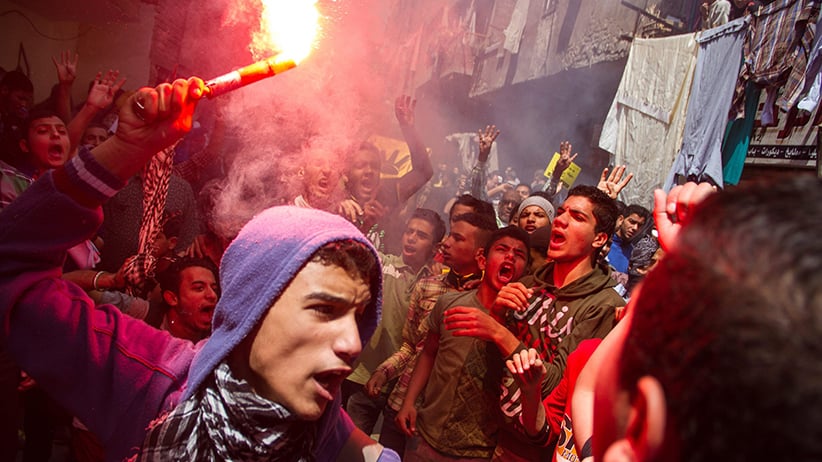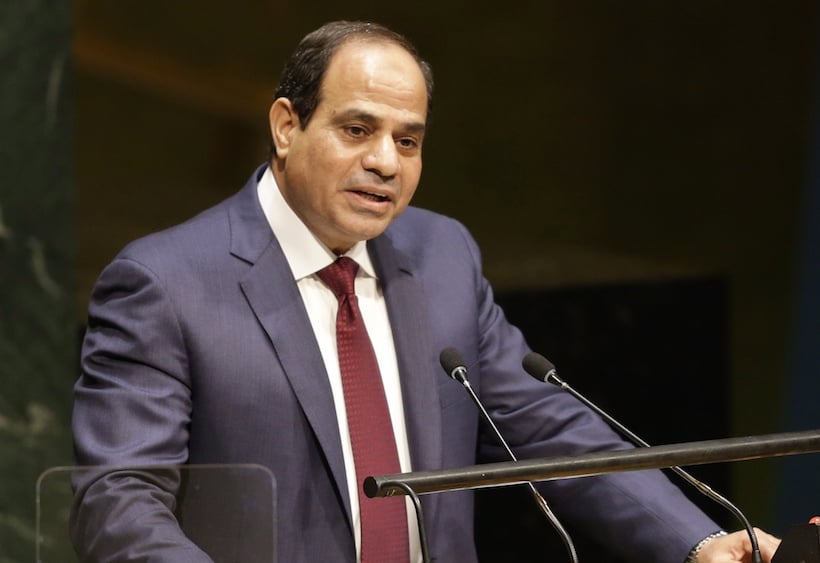Winter comes for the Arab Spring
Four years after the revolution, Egypt has finally erased whatever meagre progress was made
An Egyptian youth carries a lit flare as supporters of the Muslim Brotherhood gather in the El-Mataria neighborhood of Cairo, Egypt, to protest the 20-year sentence for ousted president Mohammed Morsi and verdicts against other prominent figures of the Brotherhood Friday, April 24, 2015. Morsi was convicted of using force against protesters and sentenced to 20 years in prison on Tuesday, the first verdict against him since he was removed by the military nearly two years ago. Belal Darder/AP
Share

Receiving a 20-year prison sentence last month was not the worst thing that’s happened to senior Muslim Brotherhood member Mohamed el-Beltagy since Mohamed Morsi, a Muslim Brother and Egypt’s first democratically elected president, was deposed in a military coup in 2013.
Beltagy, like Morsi, who also received a 20-year sentence in April, may die in jail. They are among hundreds of members of the Islamist group now in prison. But in the realm of personal tragedy, Beltagy surely sees his incarceration as insignificant compared to the fate of his 17-year-old daughter, Asmaa, who was shot as she stood among Muslim Brotherhood supporters protesting in Rabaa al-Adawiya Square in August 2013.
Video of the incident shows Asmaa, far from any visible violence or chaos, suddenly drop to the ground like a marionette whose strings have been cut. She died a short while later. It’s hard not to conclude that a sniper targeted her—possibly because she was Beltagy’s daughter.
Muslim Brotherhood supporters that day were demonstrating against the coup that had removed Morsi from power weeks earlier. At least 590 civilians were killed in the square and at another nearby camp when security forces attacked them. According to Egypt’s interior ministry, 43 security personnel also died.
Some of the charges against Beltagy and other Muslim Brotherhood leaders stem from a different deadly clash—this one outside the presidential palace on Dec. 5, 2012, when Morsi was still president. Muslim Brotherhood supporters attacked demonstrators who were protesting attempts by Morsi to expand his powers and push through a constitution many believed was too Islamic. Eleven died in that incident.
Among the many differences between the two events is that while Beltagy and others who are alleged to have incited the attack outside the presidential palace have been vigorously prosecuted, no one in Egypt’s security apparatus has been held to account for the massacre of Egyptian civilians protesting the coup that toppled Morsi.
That gap in how justice is applied says much about what’s changed—and what hasn’t—in Egypt since the Arab Spring erupted a little more than four years ago. The Egyptians who flooded Cairo’s Tahrir Square in 2011 were protesting the 30-year autocracy of then-president Hosni Mubarak. They were fighting for democracy and greater political freedoms and, after 18 days and hundreds of deaths, they succeeded in forcing Mubarak from office. For a while, it seemed they were also building a new Egypt, that their apparent victories were irrevocable. Instead, they have all but melted away.
Abdel-Fattah el-Sisi, the Egyptian army chief who ousted Morsi in the 2013 coup and was subsequently elected president with almost 97 per cent of the vote, leads a military dictatorship with a thin and unconvincing democratic veneer.
The Muslim Brotherhood has been declared a terrorist organization and outlawed. Thousands of dissidents are in jail. Critical media organizations are threatened and bullied. Canadian Al Jazeera journalist Mohamed Fahmy spent more than a year in jail and is now free on bail pending a retrial, but cannot leave the country. Other journalists have learned to say what’s expected of them. Some human rights organizations have sent staff out of the country for their own safety, or left altogether. “Egypt is going through its most repressive period of the last 30, if not 60-plus, years,” says Eric Trager, a fellow at the Washington Institute for Near East Policy. “The new regime tends to view all opposition as threatening, so it’s cast a pretty wide net in its crackdown.”
But many Egyptians support Sisi. Morsi was an unpopular and divisive president. The size of the crowds that demanded his ouster in June and July 2013 may have been bigger than the ones during the original Arab Spring protests. Mustapha Kamel Al-Sayyid, a political science professor at Cairo University, says that during Morsi’s presidency, he tried to politicize the bureaucracy and appointed sympathetic journalists to leading positions. He drafted an illiberal and Islamic constitution “which could open the way for serious restrictions on political and civil rights.”

Sisi is no democrat, either, Sayyid says, rating political freedoms in Egypt today as worse than they were under Mubarak. But some of the repression of the Morsi era helps to explain Egyptians’ approval of Sisi. “The reversal of the Arab Spring started already under the rule of the Muslim Brothers,” says Sayyid. “The Arab Spring is a dream that did not last very long.”
And yet, despite Sisi’s abuses of political freedoms and human rights, and even as his government cultivates an anti-foreign brand of nationalism, he is popular among many Western leaders. This is partly because of a speech he delivered at Al-Azhar University on Jan. 1 in which he called for a “religious revolution” in Islam that would forcibly reject extremist interpretations of the faith.
Michele Dunne, a senior associate at the Carnegie Endowment for International Peace, describes that speech as a “triumph of marketing,” and indeed, it was promoted by Egypt’s embassy to the United States. She doubts it accomplished much in Egypt. “I really think that any young Egyptian who is susceptible to radicalization would see Sisi as having no credibility to speak about Islam and morality,” says Dunne, who previously worked as a Middle East specialist at the U.S. Department of State.
Egypt’s relationship with the United States has nevertheless improved. In March, President Barack Obama lifted an arms freeze on Egypt that Washington had imposed after the coup—freeing up the delivery of fighter jets and tanks. When it originally imposed the arms freeze in October 2013, the White House said it was halting certain large-scale weapons deliveries pending “credible progress” toward a democratically elected civilian government and free and fair elections. On announcing that weapons deliveries would restart, the White House cited American “national security.”
Egypt is a longstanding American ally in the Middle East—and a longtime recipient of American military aid. Dunne believes Washington overestimates the value of its friendship with Egypt. Egypt does occupy important real estate. Libya, on its western border, is roiled by civil war and a jihadist insurgency. Egypt also shares a border with Israel, with whom it has had a peace treaty since 1979. And Egypt is battling jihadists within its borders, most notably, in the Sinai Peninsula.
But Dunne says Egypt does not do a particularly good job of combatting terrorism, and she’s not convinced America’s close military relationship with Egypt is doing much to improve it. As for Egypt and Israel, she says the two countries have outgrown the need for an American chaperone. “The Egypt-Israel relationship is firmly established, and I believe it has its own dynamic now. It’s been better at some times, worse at some times, but that doesn’t have much to do with the United States. There is no reason for that relationship to be triangulated by the United States anymore. I don’t think the United States needs to pay Egypt to maintain the peace treaty with Israel.”
In fact, notes Dunne, co-operation between Cairo and Tel Aviv was particularly close when U.S. arms shipments were halted and relations between Washington and Cairo chilled. “I am concerned that restoring the aid deliveries that were suspended in 2013 sends a public message of embrace and endorsement of a regime that continues to carry out very significant human rights abuses, and is also quite ineffective in battling terrorism,” says Dunne.
But, according to Trager, America’s ability to influence Egypt’s approach to human rights is limited, whether or not it sends arms. “The Obama administration withheld weapons for 17 months pending progress toward a democratic transition. And not only did Egypt make absolutely no progress toward democracy, the relationship between Washington and Cairo became strained to neither country’s benefit—certainly not Washington’s benefit,” he says. “Foreign policy is about shaping the way states behave externally. It’s not really good at shaping the way states behave internally.”
If that’s true, Egyptians hoping to build a more democratic country will have to do so largely on their own. According to Sayyid, who has watched all the hope and frustration of the last four years, they still have a long way to go: “Unfortunately, we went back to the days that preceded the Arab Spring.”